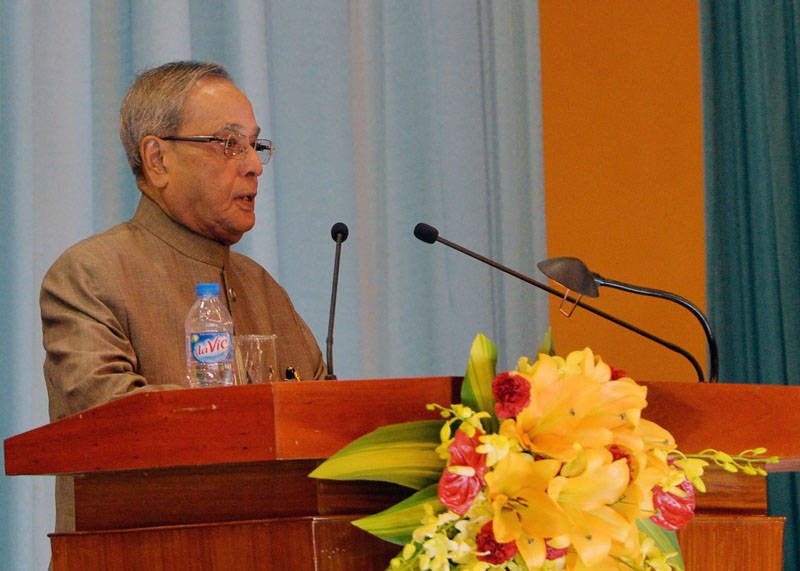
Your Excellency, President Truong Tan Sang,
Distinguished Ladies and Gentlemen,
I am delighted to join you in inaugurating the India Study Centre. Both our Governments have an abiding commitment to our people-to-people ties. The establishment of this Study Centre is yet another example of this.
Strong civilisational bonds exist between India and Vietnam since the 2nd century A.D. These have, today, evolved into a vibrant and multi-dimensional Strategic Partnership. Our current dialogue is based on the close understanding and friendship of the founding fathers of our two great nations. India and Vietnam have had similar experiences in shaping our national identities – our struggle for freedom from colonial rule, our thirst for development and the realization of the aspirations of our people.
Today, our bilateral dialogue is frank and our co-operation in areas of common interest has grown from strength to strength. We are engaged in joint initiatives and programmes across a wide range of areas of common interest. In 2012, we celebrated the 40th anniversary of the establishment of our diplomatic relations. We have no irritants between us. President Ho Chi Minh had likened the India- Vietnam relationship to a "cloudless sky”.
Our shared perceptions are shaped by the teachings of the Lord Buddha. These have inculcated in us a deep respect for peace and the harmonious co-existence of all living beings. On most regional and global issues, we have a convergence of views. Our Governments collaborate closely in the United Nations, World Trade Organisation and many regional and multilateral fora. Both our peoples are determined to create a society that is peaceful, prosperous and stable. With the changing dynamics in the Asia-Pacific, there has been a shift of economic and strategic gravity towards Asia. We see a growing role and relevance for our partnership in this context.
Excellency, we, in India, consider Vietnam as a trusted friend and an important pillar of India’s "Look East Policy”. In our co-operation in the area of defence and security, we are committed to the promotion of peace in our region.
Vietnam is also one of India’s most important economic partners. Our bilateral trade has increased significantly - by 31% - to USD 8 billion in the year 2013-2014, surpassing the target that we had jointly set for ourselves.
Excellency, I would emphasise the importance of further strengthening our economic linkages. The potential of our complementarities is tremendous. There are new opportunities in trade and investment. There are also significant prospects for building regional supply chains. We can and must encourage joint ventures between our investors - in India and Vietnam and also in third countries. These, in turn, will undoubtedly promote growth, employment and efficiencies in both our economies.
Both our Governments have accorded the fullest encouragement, over the years, to strengthening the linkages between our peoples. Our investors and businessmen, professionals and researchers, technocrats and academicians as well as our Parliamentarians and our youth have successfully been working together. Our bilateral dialogue seeks to achieve higher levels of their collaboration for our mutual benefit.
We have also prioritised the enhancement of the connectivity between us – and here I refer to the physical, institutional and people to people linkages. I am delighted that direct flights between India and Vietnam are being started later this year and I hope that it will soon be possible to also drive from Hanoi to Kolkata. The Archaeological Survey of India will be taking up a project for restoration and conservation of the Cham monuments at My Son. We look forward to opening an Indian cultural centre in Hanoi which will, no doubt, bring different aspects of Indian culture to your beautiful country.
Both of us would like to see an intensification of the exchanges between our universities and institutions. I am delighted to note that the Ho Chi Minh National Academy for Politics and Public Administration has already evolved a co-operation framework with the prestigious Indian Institute of Management in Bangalore and with the Indian Institute of Public Administration in Delhi. We must do what we can to stimulate the curiosity of our younger generation in each other. We must encourage them to connect in a mutually beneficial relationship to sustain the brotherly sentiment that has bonded our societies for generations. I have no doubt that this Centre will grow into a focal point for academic exchanges that will enrich the bilateral discourse between our peoples.
Excellency, with these words, I thank you for your support to the Centre. I would like to extend my thanks to the Ho Chi Minh National Academy for Politics and Public Administration for taking this initiative and offer my best wishes for the success of the India Study Centre.
Thank you.
